AUSTIN, TX – April 7, 2022
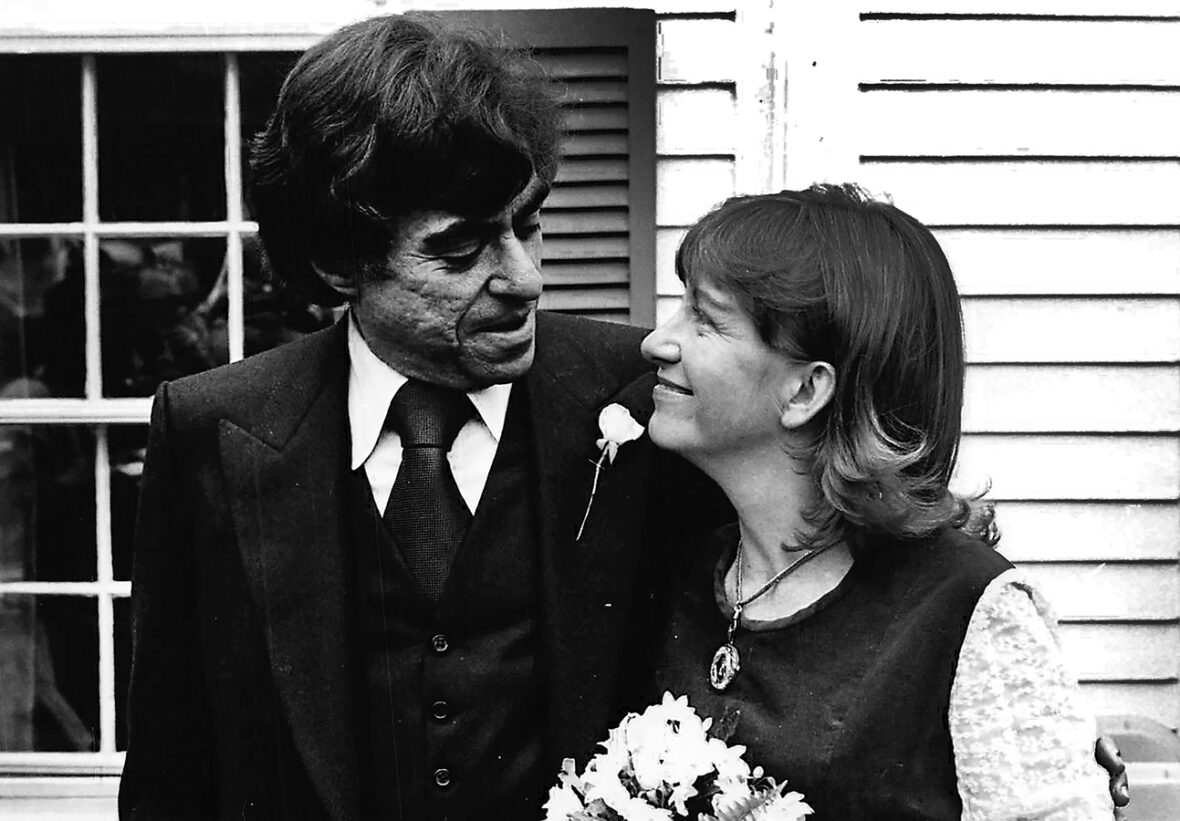
The Dolph Briscoe Center for American History at the University of Texas at Austin has acquired the papers of Richard N. Goodwin, speechwriter and policymaker for Presidents John F. Kennedy and Lyndon B. Johnson, and Doris Kearns Goodwin, acclaimed presidential historian and Pulitzer Prize-winning author. In addition, Ms. Goodwin will join the Briscoe Center’s Advisory Council.
![Draft of President Johnson's address to Congress on Civil Rights (“We Shall Overcome”), March 15, 1965 speech [first page]](https://briscoecenter.org/wp-content/uploads/2022/04/Goodwin_Speech_1965.jpg)
Mr. Goodwin’s papers stretch more than six decades, from roughly 1950-2014, and provide an intimate look into his distinguished professional career. The papers document Mr. Goodwin’s public service as a clerk for Supreme Court Justice Felix Frankfurter, as well as his work as a House subcommittee investigator into the rigged television game show Twenty-One (adapted into Robert Redford’s 1994 film Quiz Show). Mr. Goodwin’s archive, an extraordinary time capsule of the 1960s, includes memos and notes on his contributions to shaping national and international policy during the Kennedy and Johnson administrations, including the War on Poverty and the Civil Rights movement. Among the treasures are drafts of several of the most historically significant speeches of the 20th century, including JFK’s inaugural speech, and LBJ’s “Great Society” and “We Shall Overcome” speeches. The draft of LBJ’s landmark Howard University speech calling for affirmative action is accompanied by a telegram from Martin Luther King Jr. that reads: “Never before has a president articulated the depths and dimensions of the problems of racial injustice more eloquently and profoundly.”
Joseph Califano, LBJ’s domestic policy adviser, described Mr. Goodwin as “the greatest political public policy speechwriter in the history of this country.” His papers provide keen insight on how speech writing can lead to policy and law.
“I have loved history my whole life, so I am delighted that my papers and those of my late husband will reside together as part of the outstanding collection at the Briscoe Center,” said Ms. Goodwin. “I’m impressed by the depth and breadth of the Briscoe Center’s holdings, and also by its innovative mission as a center that actively conducts its own research into its collections, as well as facilitating the research of others. My hope is that our papers will offer unique insight and rich potential for students, historians, and other researchers who will find the material not only informative but also inspiring.”
The archive of Ms. Goodwin, author of seven critically acclaimed and bestselling books and who New York Magazine heralds as “America’s Historian-in-Chief,” spans six decades from the 1960s to near present. The papers provide a road map of her writing process from her initial foray into a subject, and include original research materials, interviews, early outlines, primary sources, and manuscripts.
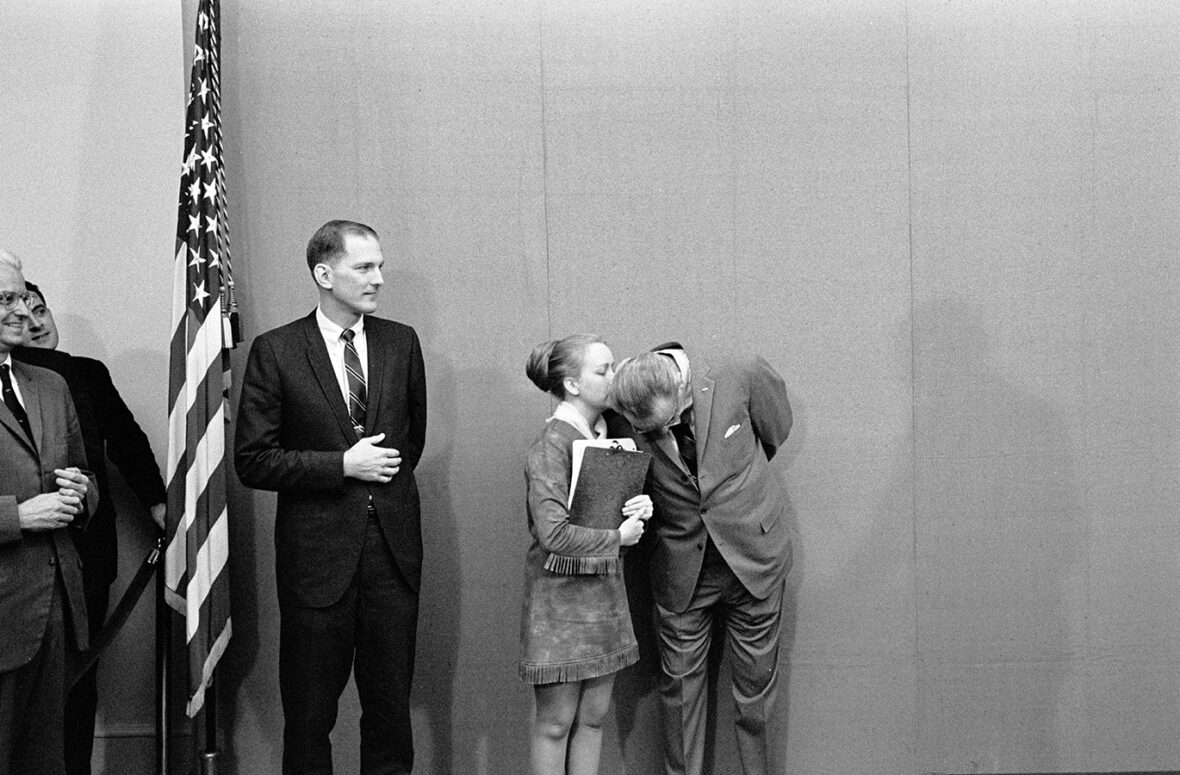
Ms. Goodwin is best known as a preeminent public intellectual, presidential historian, and biographer frequently seen on television putting today’s news into historical context. Her books include the 1995 Pulitzer Prize-winning No Ordinary Time: Franklin and Eleanor Roosevelt: The Home Front During World War II; Team of Rivals: The Political Genius of Abraham Lincoln, which won the Lincoln Prize and served as the basis for Steven Spielberg’s 2012 award-winning film, Lincoln; and her most recent, Leadership: In Turbulent Times, which explores the early development, growth, and exercise of leadership. Her papers chart the course of her growth as a historian and writer and include professional correspondence, documents, photographs, visual recordings, news clippings, and other memorabilia.
“This acquisition is a landmark event in the relatively short history of the Briscoe Center,” said Don Carleton, the Briscoe Center’s executive director. “These two archives cover an amazingly wide range of significant events in American political, presidential, and cultural history extending from the late 1950s until the very recent past. Adding to my excitement about these collections is the fact that Doris has agreed to be a member of our Advisory Council and will serve as an advisor to and ambassador for the Briscoe Center on an ongoing basis. I eagerly look forward to working with her to continue to build and promote the Briscoe as one of this nation’s leading history centers.”
As a member of the Briscoe Center advisory council, Ms. Goodwin will support the mission of the center and the university through appearances on the UT Austin campus, including lectures, seminars and consultations with students. “I am excited to be returning to Texas, to visit these boxes that not only open a door to our country’s history but hold memories of the long life I spent with my husband and of our cherished careers, and to share these memories and my love of history with the UT students and faculty through lecturing, giving seminars, and simply talking with students.”
“One cannot overstate the value of having the papers of both Richard and Doris Goodwin accessible to our students and faculty,” said historian Dr. H.W. Brands, the Jack S. Blanton Sr. chair in History at UT Austin. “The Briscoe Center has long championed the cause of history and the accessibility of essential documentation of our nation’s past. The Goodwin collections further enhance the academic reputation of UT Austin as a leading center for the study of history.”
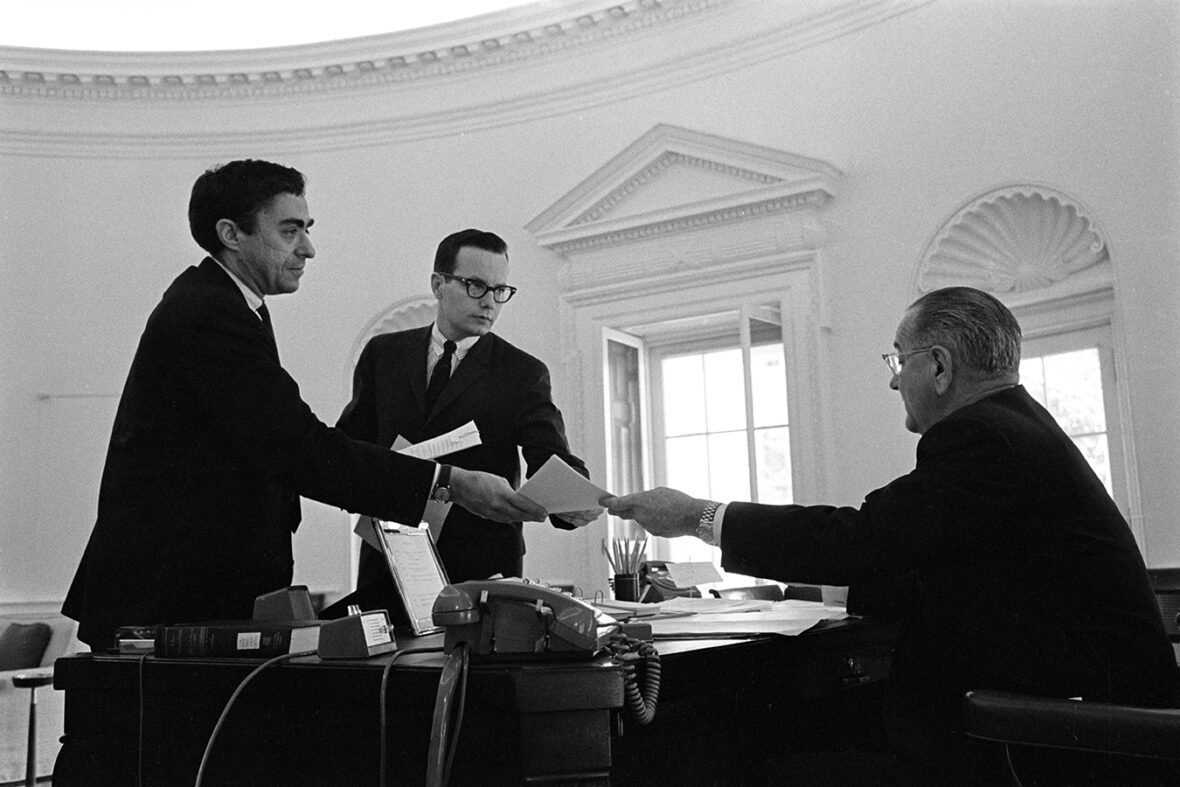
“It is impossible to understand the history of the 1960s in the United States without an appreciation for Dick Goodwin’s formidable contributions. His March 1965 speech for LBJ on voting rights, for instance, may be one of the most important presidential speeches ever written,” said Mark Updegrove, president and CEO of the LBJ Foundation. “When paired with the archive of Doris Kearns Goodwin, one of our most gifted historians, these materials further the reputation of the Briscoe Center as one of the most prestigious centers for the study American history—and the fact that it’s just steps away from the LBJ Presidential Library makes the center a Mecca for 1960s scholarship.”
The Briscoe Center has a sampling of materials from the Goodwin Papers on exhibit in its New Acquisitions Gallery, located in the Research and Collections division of the center (Sid Richardson Hall, Unit 2) on the UT Austin campus.
About Richard N. Goodwin and the Goodwin Papers
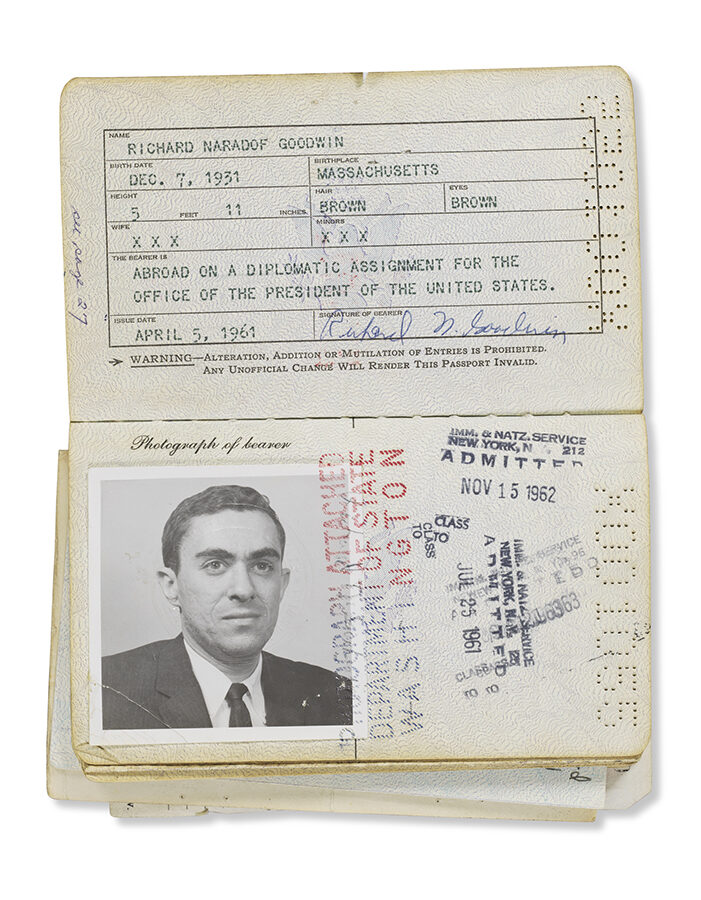
A graduate of Tufts University and Harvard Law School, Richard Goodwin clerked for Supreme Court Justice Felix Frankfurter and served as special counsel to the Legislative Oversight Subcommittee of the U.S. House of Representatives. In 1959, he joined Sen. John F. Kennedy’s staff during his successful campaign for the presidency and became one of Kennedy’s primary speechwriters. As a member of Kennedy’s White House staff, Mr. Goodwin served as special counsel, a member of Task Force on Latin American Affairs and Deputy Assistant Secretary of State for Inter-American Affairs. After serving as secretary-general of the International Peace Corps, he joined LBJ’s staff in 1964 as a special assistant, crafting many of the president’s most memorable speeches. He left public service in 1965 and served as a fellow at Wesleyan University’s Center for Advanced Studies, returning to politics in 1968 to write speeches for presidential candidates Robert Kennedy and Eugene McCarthy. Mr. Goodwin’s career continued as an author, playwright, and a political and cultural critic and commentator for such publications as Rolling Stone, The New Yorker, The Boston Globe,and the Los Angeles Times. He died in 2018 at age 86 after a brief bout with cancer.
Mr. Goodwin’s papers span from approximately 1950 to 2014 and are a comprehensive record of his entire professional career. The papers include his service as clerk for Justice Frankfurter, memos and depositions into his investigation into the game show Twenty-One, JKF’s handwritten edits on Mr. Goodwin’s drafts of speeches, a secret memorandum to JFK describing Mr. Goodwin’s controversial four-hour meeting with Cuba’s Che Guevara (and the cigar box gifted by Guevara), LBJ’s handwritten comments on memos from Mr. Goodwin, and personal letters from First Lady Jacqueline Kennedy. Of particular importance are the drafts for one of the greatest presidential speeches in American history: Johnson’s powerful “We Shall Overcome” speech, delivered immediately after the violence in Selma, Alabama, in March 1965. Also included are drafts of LBJ’s 1965 “Howard University” speech calling for affirmative action and Senator Robert F. Kennedy’s 1966 “Ripple of Hope” speech, outlining essential human rights and freedoms (which is excerpted on RFK’s gravestone). The archive also includes the concession speech Mr. Goodwin helped write for Vice President Al Gore in 2000, and materials used to write his books on American political history, including The American Condition, Remembering America, and Promises to Keep.
About Doris Kearns Goodwin and the Goodwin Papers
![Oral History Interview with John Boettinger [grandson of Franklin Roosevelt], from No Ordinary Time research materials. Doris Kearns Goodwin Papers, courtesy of the Briscoe Center for American History.](https://briscoecenter.org/wp-content/uploads/2022/04/No_Ordinary_Time_interview_notes.jpg)
The Briscoe Center’s acquisition of Ms. Goodwin’s papers brings her career full circle, back to the days when she was 24 years old and selected as a White House Fellow. She worked directly for President Lyndon Johnson in the White House for a year, and then accompanied him to his Texas ranch to help on his memoirs. That extraordinary privilege fired within her the desire to be a presidential historian. Ms. Goodwin taught government for ten years at Harvard, including a course on the American presidency.
Her first book, Lyndon Johnson and the American Dream, became a national bestseller and achieved critical acclaim. She was awarded the Pulitzer Prize for No Ordinary Time: Franklin and Eleanor Roosevelt: The Home Front in World War II. Her bestselling book The Fitzgeralds and the Kennedys was adapted into an award-winning five-part television miniseries. Ms. Goodwin’s bestselling memoir Wait Till Next Year is a charming story of growing up loving her family and baseball. She earned the Lincoln Prize for Team of Rivals: The Political Genius of Abraham Lincoln, which provided the basis for Steven Spielberg’s Academy Award-winning film Lincoln starring Daniel Day-Lewis. She was the first historian to receive the Lincoln Leadership Prize from the Abraham Lincoln Presidential Library Foundation. The Bully Pulpit: Theodore Roosevelt, William Howard Taft and the Golden Age of Journalism was awarded the Carnegie Medal. Her latest bestselling book, Leadership: In Turbulent Times, is the basis for the History Channel’s miniseries on Presidents Abraham Lincoln and Theodore Roosevelt.
Ms. Goodwin graduated magna cum laude from Colby College. She earned a Doctor of Philosophy degree in Government from Harvard University.
Ms. Goodwin’s papers span from the 1960s to the near present and include personal and professional correspondence, documents, publications, photographs, oral histories, audio and visual recordings, news clippings and the research files and manuscripts for her books. Her papers contain research for her books, from original conceptions and proposals to excerpts from primary sources, newspapers, diaries, letters, interviews, lists of books read, handwritten notes, the construction process of the books, chapter after chapter.
The Richard Goodwin and Doris Kearns Goodwin papers are closed at this time for processing. The center will announce when the collections are open to researchers.
High-resolution media images are available upon request.
Selections from the Richard Goodwin and Doris Kearns Goodwin papers
Media contact:


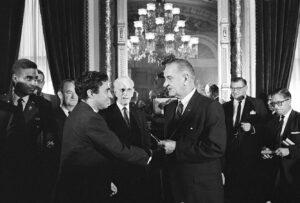
![Draft of President Johnson's “Great Society” speech [first page], delivered May 22, 1964, at Ann Arbor, Michigan. Richard N. Goodwin Papers, courtesy of the Briscoe Center for American History.](https://briscoecenter.org/wp-content/uploads/2022/04/Goodwin_Speech_1964-233x300.jpg)
![Draft of President Johnson's address to Congress on Civil Rights (“We Shall Overcome”), March 15, 1965 speech [first page]](https://briscoecenter.org/wp-content/uploads/2022/04/Goodwin_Speech_1965-231x300.jpg)
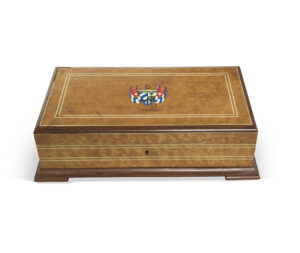
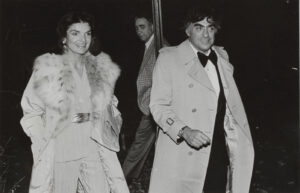
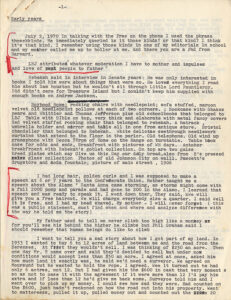
![Oral History Interview with John Boettinger [grandson of Franklin Roosevelt], from No Ordinary Time research materials. Doris Kearns Goodwin Papers, courtesy of the Briscoe Center for American History.](https://briscoecenter.org/wp-content/uploads/2022/04/No_Ordinary_Time_interview_notes-235x300.jpg)
